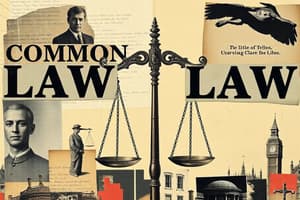Podcast
Questions and Answers
What does the term 'likely' mean as defined by case law?
What does the term 'likely' mean as defined by case law?
- An assumption based on past events
- A real possibility (correct)
- An absolute certainty
- A vague expectation
How is the term 'significant' interpreted in a legal context?
How is the term 'significant' interpreted in a legal context?
- Only applicable in criminal law
- Relative to the specific case
- Considerable, noteworthy or important (correct)
- Minor and inconsequential
What is the main characteristic that distinguishes a common law system from a civil law system?
What is the main characteristic that distinguishes a common law system from a civil law system?
- Common law relies on precedents and judicial rulings (correct)
- Common law is based on codified statutes only
- Common law allows for broader legislative authority
- Common law does not involve the interpretation of statutes
In the context of legal definitions, what does the present tense imply regarding the risk of a child at the time a care order is sought?
In the context of legal definitions, what does the present tense imply regarding the risk of a child at the time a care order is sought?
What does 'codification' refer to in a civil law system?
What does 'codification' refer to in a civil law system?
What defines a legal system in a particular jurisdiction?
What defines a legal system in a particular jurisdiction?
Which of the following statements is true about the English Legal System?
Which of the following statements is true about the English Legal System?
What is the primary source of law in a common law system?
What is the primary source of law in a common law system?
How does the Civil law system differ from the Common law system?
How does the Civil law system differ from the Common law system?
What is the doctrine of precedent in the Common law system?
What is the doctrine of precedent in the Common law system?
Which of the following is an example of primary legislation?
Which of the following is an example of primary legislation?
In the context of the English Legal System, what is secondary legislation?
In the context of the English Legal System, what is secondary legislation?
What happens when legislation is enacted by Parliament in a common law system?
What happens when legislation is enacted by Parliament in a common law system?
What primarily constitutes secondary legislation?
What primarily constitutes secondary legislation?
What is the role of judges when there is existing legislation on a topic?
What is the role of judges when there is existing legislation on a topic?
Which case is noted for establishing the law of negligence?
Which case is noted for establishing the law of negligence?
What does the doctrine of precedent entail?
What does the doctrine of precedent entail?
What does the term 'threshold test' refer to in the context of legal responsibilities towards children?
What does the term 'threshold test' refer to in the context of legal responsibilities towards children?
Which of the following is true about the relationship between statutes and case law?
Which of the following is true about the relationship between statutes and case law?
What is the definition of 'harm' under section 31(9) of the Children Act?
What is the definition of 'harm' under section 31(9) of the Children Act?
Which statement about judges' powers is accurate?
Which statement about judges' powers is accurate?
Flashcards are hidden until you start studying
Study Notes
Legal Systems Overview
- A legal system comprises rules governing a specific geographical area, known as a jurisdiction, which may not align with political boundaries.
- The United Kingdom features three distinct legal systems:
- England and Wales (often referred to as the English Legal System)
- Scotland
- Northern Ireland
Common Law vs. Civil Law Systems
-
Common Law System:
- Emphasizes case law; judges' rulings play a pivotal role.
- The doctrine of precedent guides current cases based on past rulings.
- Parliamentary legislation is a source of law but is interpreted by judges, allowing case law to develop further even when legislation exists.
- Primary sources include both legislation and case law.
-
Civil Law System:
- Based on Roman law and focuses on codification (comprehensive codes/statutes).
- Decisions are made by applying individual case circumstances directly to these codes, minimizing the role of case law and the doctrine of precedent.
Sources of Law in the UK
- Legislation is categorized into:
- Primary Legislation: Statutes or Acts made by Parliament.
- Secondary Legislation: Statutory instruments, mainly regulations authorized by Parliament.
- Case law emerges predominantly from higher court decisions and is documented in Law Reports.
Interaction of Legislation and Case Law
- In areas with legislation, judges interpret the law while referring to previous case law as guidance.
- The law of negligence is exemplified by the landmark case Donoghue v Stevenson, where judicial decisions shaped legal principles.
- Statutes take precedence over case law; however, judges' interpretations of statutes become part of the law under the doctrine of precedent.
Statutory Interpretation Example
- The Children Act outlines a threshold test for care orders, emphasizing the child's risk of significant harm.
- Key terms (e.g., "likely," "significant," "is") are subject to interpretation through both statutory definitions and case law, illustrating the interaction between legislation and case law in common law systems.
Importance of Precedent
- The doctrine of precedent ensures that judicial interpretations are relevant in future cases, creating a cohesive legal framework that practitioners must navigate.
- Legal practitioners need to research and apply a combination of statutory and case law to provide effective client advice.
Studying That Suits You
Use AI to generate personalized quizzes and flashcards to suit your learning preferences.




